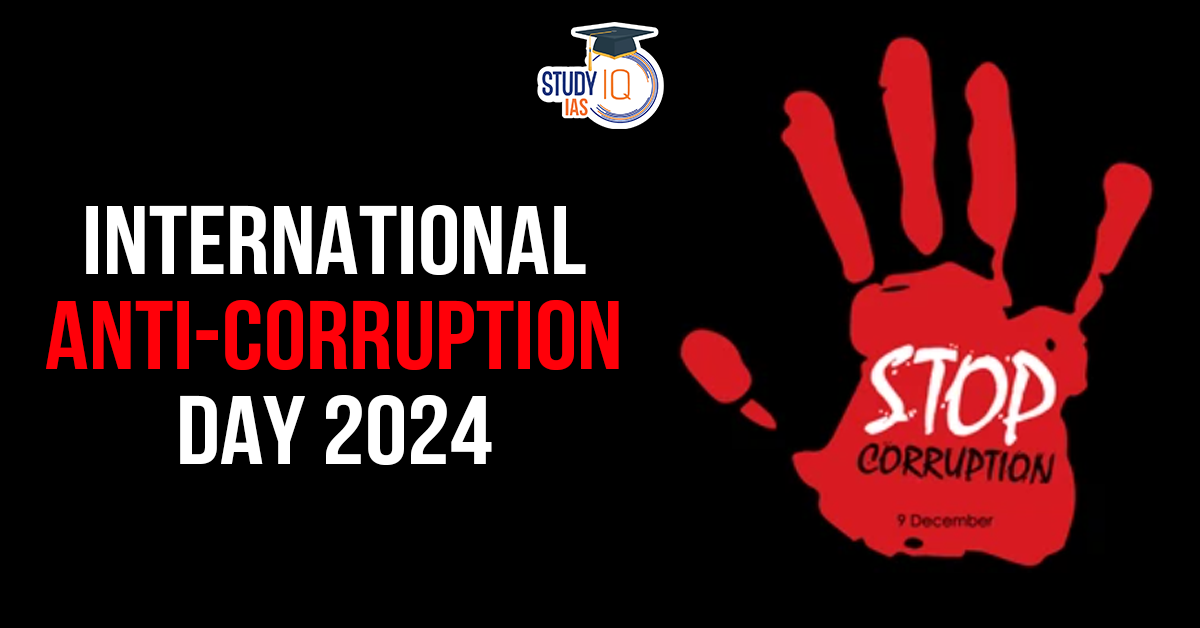Table of Contents
International Anti-Corruption Day is observed every year on 9 December to sensitize the masses against the harmful influences of corruption and encourage efforts to eliminate the malady from the earth. The theme for International Anti-Corruption Day 2024 is “Uniting with Youth Against Corruption: Shaping Tomorrow’s Integrity” – empowering young people to be active duty-bearers in eliminating the menace of corruption from society. This day reminds us that we all share collective responsibility for ensuring the transparency, accountability, and integrity of governments, institutions, and societies around the world.
What is International Anti-Corruption Day?
International Anti-Corruption Day, which was created in 2003 by the United Nations, is marked annually to emphasize the fight against corruption-a critical challenge to democratic governance, economic development, and citizen welfare. It emphasizes the provision of more transparency in public institutions and in business practice and governance.
Observe this day towards the goals set out in the United Nations Convention against Corruption, the world’s first legally binding international anti-corruption instrument. The campaign calls on governments, civil society, and individuals to take and implement concrete measures to combat corruption.
International Anti-Corruption Day 2024 Theme
The theme for International Anti-Corruption Day 2024 is “Uniting with Youth Against Corruption: Shaping Tomorrow’s Integrity.” The theme focuses on empowering the youth to join in the fight against corruption. The almost 1.9 billion young people in the world comprise almost a quarter of the world’s population and are thus integral to the endeavors of a future free from corruption.
Corruption severely affects young people’s opportunities, from school to work, and access of basic services. It sets back their aspirations and underutilizes their potential. This year’s slogan encourages youth to demand for accountability, participate in anti-corruption initiatives, and develop innovative solutions using technology to expose and battle corruption.
Key Highlights of the 2024 Campaign
- Focus on Youth: Young people are encouraged to actively participate in anti-corruption campaigns and become agents of change.
- Education for Integrity: The campaign emphasizes the importance of teaching values of transparency, accountability, and ethics from a young age.
- Leveraging Technology: The youth can use tools like blockchain, social media, AI, and apps to promote transparency and report corrupt practices anonymously.
- Global Involvement: The campaign will run through 2025 and culminate at the eleventh session of the Conference of the States Parties to the UN Convention Against Corruption (CoSP11) in Doha, Qatar, where youth will present their appeals directly to world leaders.
Key Issues Addressed by Anti-Corruption Day
- Governance: Corruption undermines democratic systems, leading to ineffective governance and poor public services.
- Economic Growth: Corruption diverts resources away from essential services and stunts economic development.
- Inequality: Corruption disproportionately affects marginalized communities, perpetuating inequality and social injustice.
- Environmental Degradation: Corruption often contributes to the destruction of natural resources and environmental harm.
Benefits of Combatting Corruption
- Improved Governance: Greater transparency and accountability in institutions.
- Economic Growth: Fair distribution of resources leads to better development outcomes.
- Social Justice: Reducing corruption leads to more equitable access to opportunities and services for all citizens.
- Environmental Protection: Reduced corruption results in better management of natural resources and sustainable development.
Global Impact of Corruption: The Corruption Perceptions Index
The Corruption Perceptions Index, published yearly by Transparency International, classifies countries based on perceived levels of public sector corruption. The CPI scores range from 0 (very corrupt) to 100 (very clean) for the nations. As of 2023, India ranked 93 out of 180 countries, implying moderate improvement but a call for persistent reforms in combating corruption. The CPI shall be an important tool for policymakers and civil society in monitoring progress and pointing out areas requiring additional efforts to combat national and international corruption.
Anti-Corruption Policies in India
India has implemented several anti-corruption measures aimed at fostering transparency and accountability within its institutions. Some of the key policies include:
- Central Vigilance Commission (CVC): Established to oversee corruption-related matters in public administration.
- Right to Information (RTI) Act, 2005: Empowers citizens to seek information from government bodies, promoting transparency.
- Lokpal and Lokayuktas Act, 2013: Creates ombudsman bodies to address grievances related to corruption in public services.
- Prevention of Corruption Act, 1988: Penalizes corrupt practices in the public sector.
Anti-Corruption Laws in India
India’s legal framework to combat corruption includes several critical laws, including:
- Prevention of Corruption Act, 1988: Criminalizes bribery and corrupt practices among public officials.
- Whistleblower Protection Act, 2014: Safeguards individuals who report corruption from retaliation.
- Fugitive Economic Offenders Act, 2018: Targets individuals who flee the country to avoid prosecution for economic crimes.
These laws reflect India’s commitment to creating a fairer society through effective anti-corruption measures.
Conclusion
International Anti-Corruption Day 2024 calls upon youth across the globe to take action against corruption and contribute towards a future based on integrity. The youth can contribute to a world free from corruption by promoting transparency, following ethical practices, and harnessing technology. Education, awareness, and active participation are essential for building a culture of accountability that will be carried forward by the next generation.
As the war on corruption continues, the question now is that young men and women are at the leading front of this global movement poised to make a difference. Collective efforts will build up a world where integrity shall thrive and corruption has no place.


 Utkal Divas 2025: Odisha Foundation Day ...
Utkal Divas 2025: Odisha Foundation Day ...
 List of Military Exercises of India 2024...
List of Military Exercises of India 2024...
 GPS Spoofing and Its Impact in India: A ...
GPS Spoofing and Its Impact in India: A ...





















